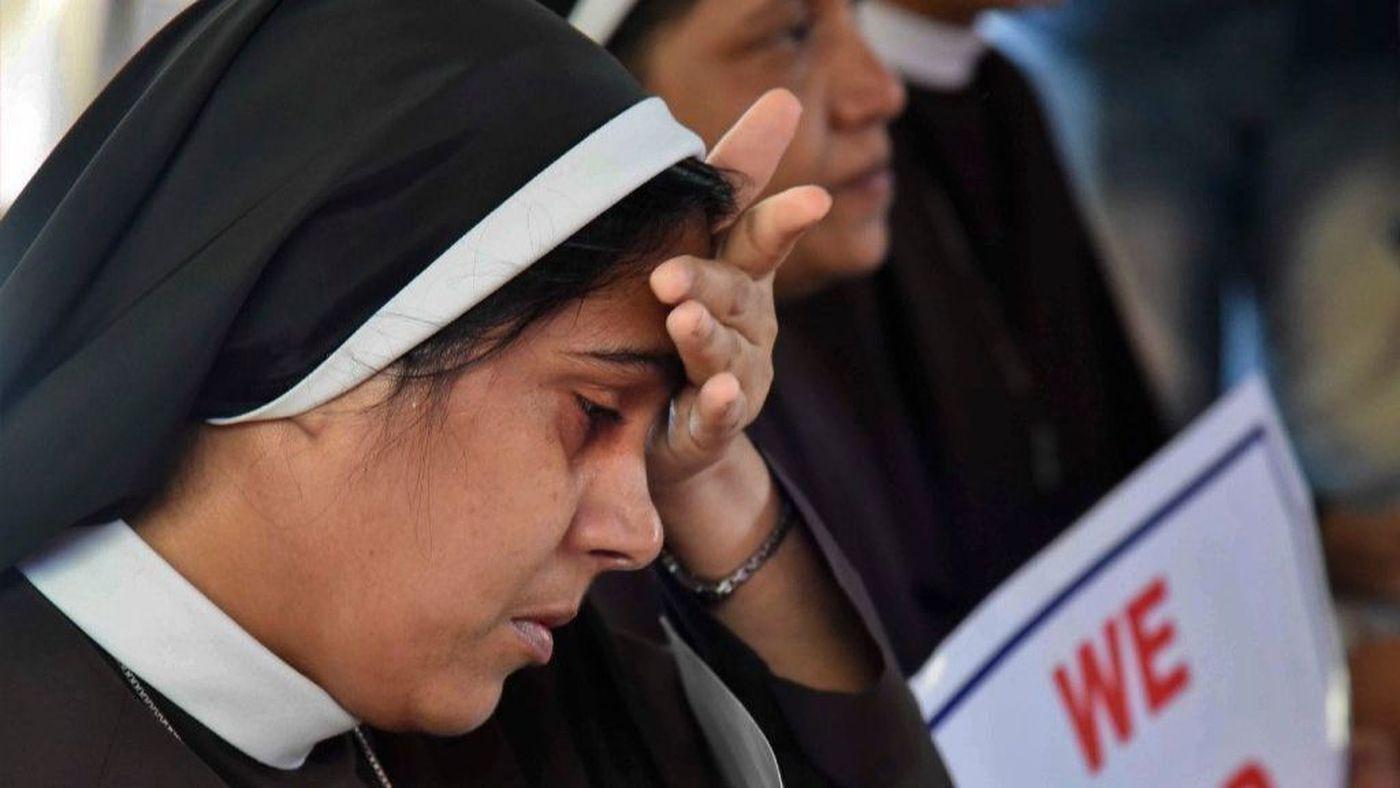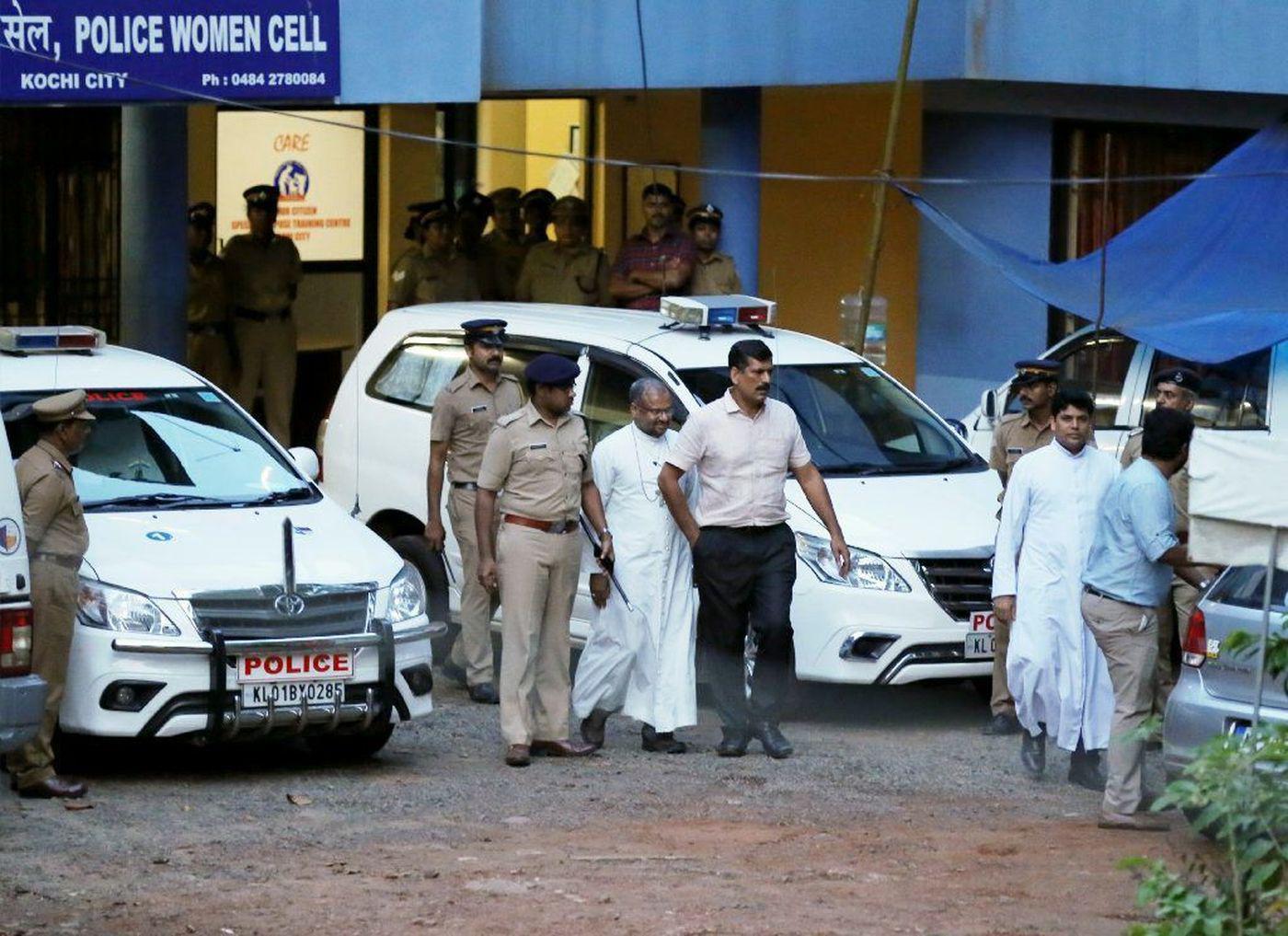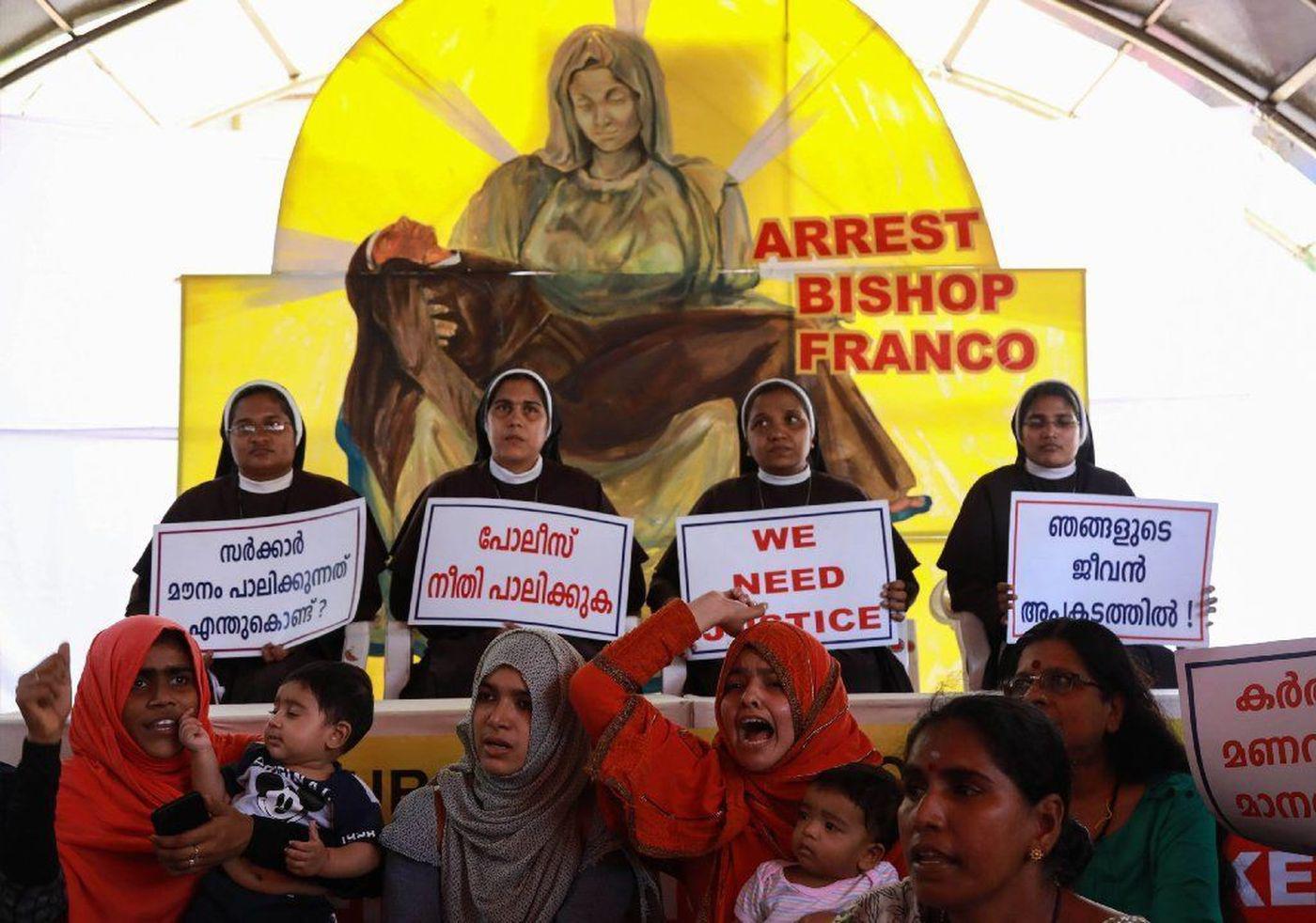|
A nun's rape allegations create a #MeToo moment in India's Catholic Church
By Shashank Bengali
For two years the nun said nothing, quietly dreading the nights that the stocky, bearded Catholic bishop would spend at her small convent in the southern Indian hills. Early last year she confided in another member of her congregation: “The bishop is compelling me to lay with him.” Soon afterward, the nun reported to church leaders that the cleric, Franco Mulakkal, had raped her 13 times between 2014 and 2016. When the leaders failed to act and the bishop filed police reports in an apparent bid to silence her, she went to authorities in June. The investigation might have stalled – as so many sexual assault cases tend to do in India, particularly when they involve the church – were it not for the accuser’s fellow nuns, who led an unprecedented public protest that has sharply divided the country’s 20 million Catholics. After a two-week sit-in that drew thousands of supporters, police in the southern state of Kerala arrested the 54-year-old bishop last month, making him the first high-ranking Indian clergyman to face charges of sexual misconduct. On Wednesday, a court denied the bishop bail, ruling that the evidence against him was credible. “It’s a watershed in the history of the Indian church,” said Jose Kavi, editor of Matters India, a website that covers religious issues. Some have gone so far as to label it India’s #MeToo moment, a long overdue reckoning with sexual abuse by powerful men in the workplace – and all the more significant because it emanated from the cloistered church in Kerala, a socially conservative state and home to one of the country’s largest Christian communities. But the six nuns of the Missionaries of Jesus order said they knew nothing of the social currents and hashtags roiling the United States when they stood up to challenge Mulakkal, the head of their diocese, controller of its purse strings and a man they were ordained to regard as a father. “When we knocked at the door of the church for help, it didn’t open for us,” said Sister Anupama, a bespectacled 30-year-old nun who led the daily protests outside a courthouse in the coastal city of Kochi, holding placards and occasionally shedding tears. “We didn’t do this only for our sister but for all women,” she said. “No one should have to sit in the street to demand justice. We had no choice.” Mulakkal is one of more than 80 Catholic bishops worldwide who have been publicly accused of sexual wrongdoing since the 1990s, and the first in an Asian country outside the Philippines. He has denied the allegations, and the Indian church and its political allies have quickly closed ranks behind him. The nun’s own order called the bishop an “innocent soul” and said she was part of an anti-church conspiracy. It asserted without evidence that she’d had affairs with other men and released a 2015 photograph of her and the bishop at a church event, in apparent violation of Indian laws prohibiting the disclosure of a rape survivor’s identity. The Times is not identifying her because of an editorial policy not to disclose the names of rape survivors. Other congregations ordered their members not to join the protest; one nun who did said she was banned from conducting prayers as punishment. The Kerala Catholic Bishops Council blamed “some vested interests and sections of the media” for making “a laughing stock” of the church and the bishop. His diocese, based in the northern city of Jalandhar, is wealthy and influential, operating hundreds of schools and mission homes across India, including three convents in Kerala. In this southern state, which is nearly 11% Catholic, the nuns’ demonstrations are seen by many faithful as tantamount to treason. “They are challenging the church, and we believers won’t allow our bishops and priests to bow their heads in front of these people,” said Kennedy Karimbinkalayil, founder of a group of lay Catholics that defends the church hierarchy. “We can’t swallow what this nun says,” he went on. “People say the bishop is powerful, yet he would come down here just to see a single woman? Just to rape her he will fly to Kerala? We can’t believe that.” Amid the storm, the accuser, a Kerala-born woman in her 40s, remained inside the convent, a two-story beige house with pink trim on the outskirts of the town of Kuravilangad. She has declined interviews and avoided photographers, emerging only in the evenings for short walks amid the coconut palms and flowering bushes. Her story has emerged mainly through letters she wrote to church officials, copies of which her supporters released to the news media. “I had tremendous fear and shame to bring this out into the open,” she wrote Sept. 8 to the papal representative in New Delhi. “I feared suppression of the congregation and threats to my family members. “At the same time I wonder why the church is closing its eyes towards the truth when I have mustered courage to stop him.” She also wrote that in June 2017, she first disclosed to a parish priest and a bishop in Kerala that Mulakkal had abused her. The complaint made its way to Cardinal Mar George Alencherry, the head of the Syro-Malabar church, one of three Catholic rites in India. Because Mulakkal and the Missionaries of Jesus are based in the northern city of Jalandhar, whose diocese falls under the Latin rite, Alencherry told her he didn’t have jurisdiction to respond to her complaint, his office said. Subsequent complaints to church officials in northern India and the Vatican failed to produce an inquiry into Mulakkal’s actions, she said. The Indian church’s response has mirrored that of other Catholic congregations when confronted with allegations of sexual abuse by clergy. As a scandal widens in Chile – where seven bishops have resigned recently over alleged coverups of sexual abuse – Pope Francis called a summit of bishops in February to discuss ways to stop predatory clerics. Since 2016, three Catholic priests in Kerala have been charged in rape cases, two involving victims who were minors. Indian Catholic reformists say the church’s tendency to conceal sexual misconduct is compounded by socially conservative notions of power and patriarchy. In Kerala, although nuns are a common sight in the church’s vast network of schools, hospitals and charities, they occupy the lowest rung of the social ladder. “I have been pushing for women’s empowerment in the church for 30 years, and this is the first time a nun has come out publicly about abuse,” said Virginia Saldanha, a former executive secretary of the women’s commission of the Catholic Bishops Conference of India. “There have been lots of abused sisters, but most of them have been silent about it. This case shows the path taken when such a case is put before the church: denial, blaming the victim, saying it’s an attack on the church. They never, ever accept that the cleric is at fault.” Catholics still talk in hushed tones about Sister Abhaya, a teenage nun whose bruised body was found in a well at a Kerala convent in 1992. Her death was initially ruled a suicide, but years later investigators reopened the case, alleging she had been killed after discovering a fellow nun and two priests in a “compromising position.” By then, evidence had been destroyed, allegedly with the help of police. The case remains unsolved, and many say it has contributed to the silence surrounding sex abuse and the impunity enjoyed by offenders. “If the Sister Abhaya case had been punished properly, this case would never have occurred,” said Father Augustine Vattoli, a reformist priest who formed the Save Our Sisters movement to support the protesting nuns. The nuns suspect Mulakkal also made advances toward others in the congregation, citing 20 sisters who left the order since 2013, when he took over as bishop. His accuser wrote of another time that a junior nun was alone in his room late one night to receive “spiritual direction.” But she withheld details of the incident from church leaders because “anyone daring to resist [Mulakkal] has to face strong consequences.” To silence the nun after she complained to church authorities, Mulakkal filed a police report against her and Anupama, saying they had threatened to commit suicide. He has said his accuser is retaliating against him for initiating an investigation into an affair she allegedly had with a married man, an allegation she denies. Police say they have not found evidence for the bishop’s claims. When Kerala officers questioned Mulakkal, they found other false statements. He initially denied having visited the Kuravilangad convent, only to be betrayed by a visitor log containing his name. When a priest close to Mulakkal offered the nuns 10 acres of land in another diocese if they withdrew their complaint, Anupama recorded the phone call and passed it to police. Still, it wasn’t until the nuns’ sit-in that the investigation gathered momentum. Police interrogated Mulakkal for three consecutive days in September before ordering his arrest. Anupama, who was stripped of her leadership position at another convent, said she expects further attacks when the case goes to trial. His supporters have pledged to turn out in large numbers, “to give an answer to these bloody nuns,” Karimbinkalayil said. Anupama, her soft voice barely audible over the whir of a ceiling fan, said the nuns remained undaunted. “Let it come,” Anupama said. “We don’t know what will happen with our lives. But we trust in God that he will give us a solution.” Contact: shashank.bengali@latimes.com
|
.
Any original material on these pages is copyright © BishopAccountability.org 2004. Reproduce freely with attribution.


